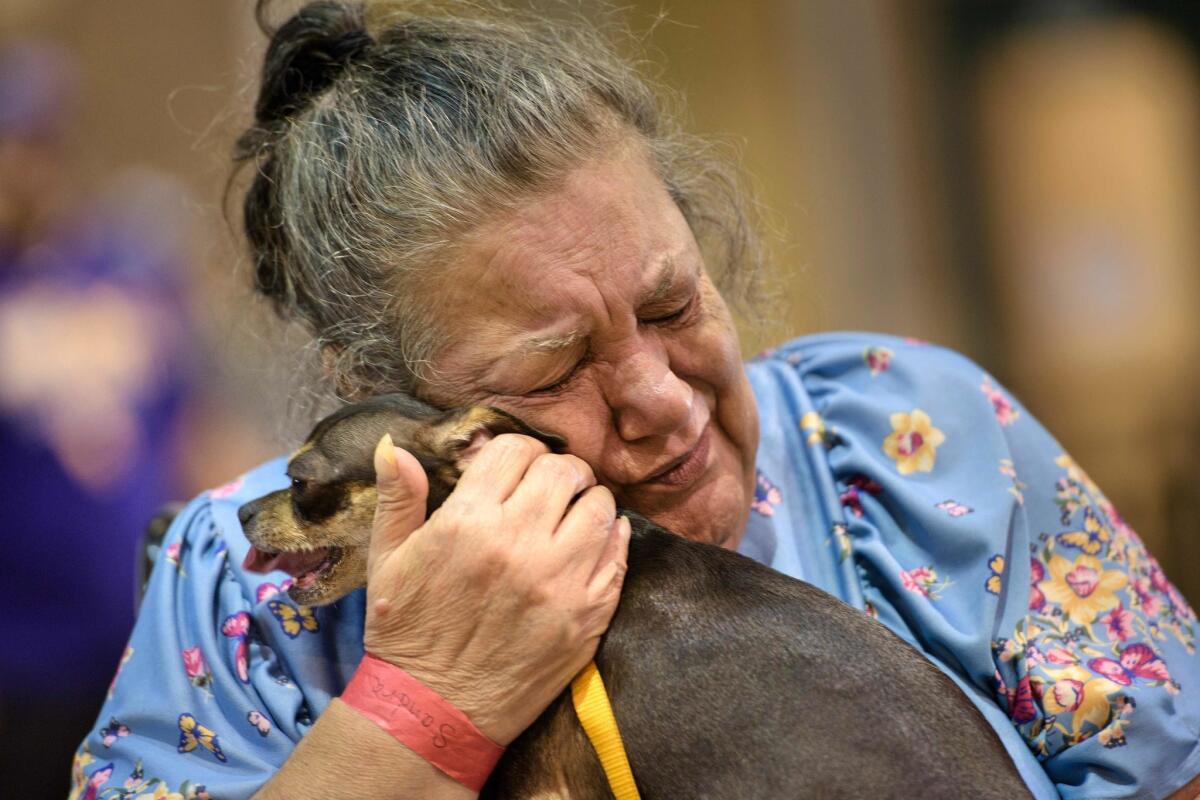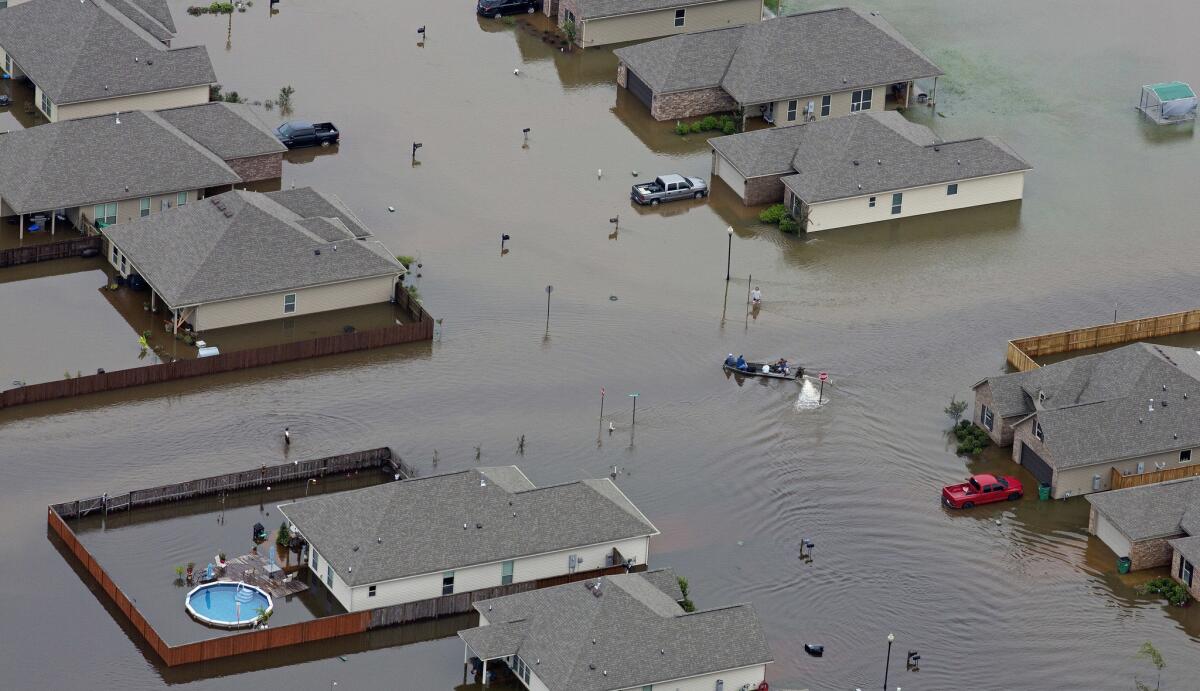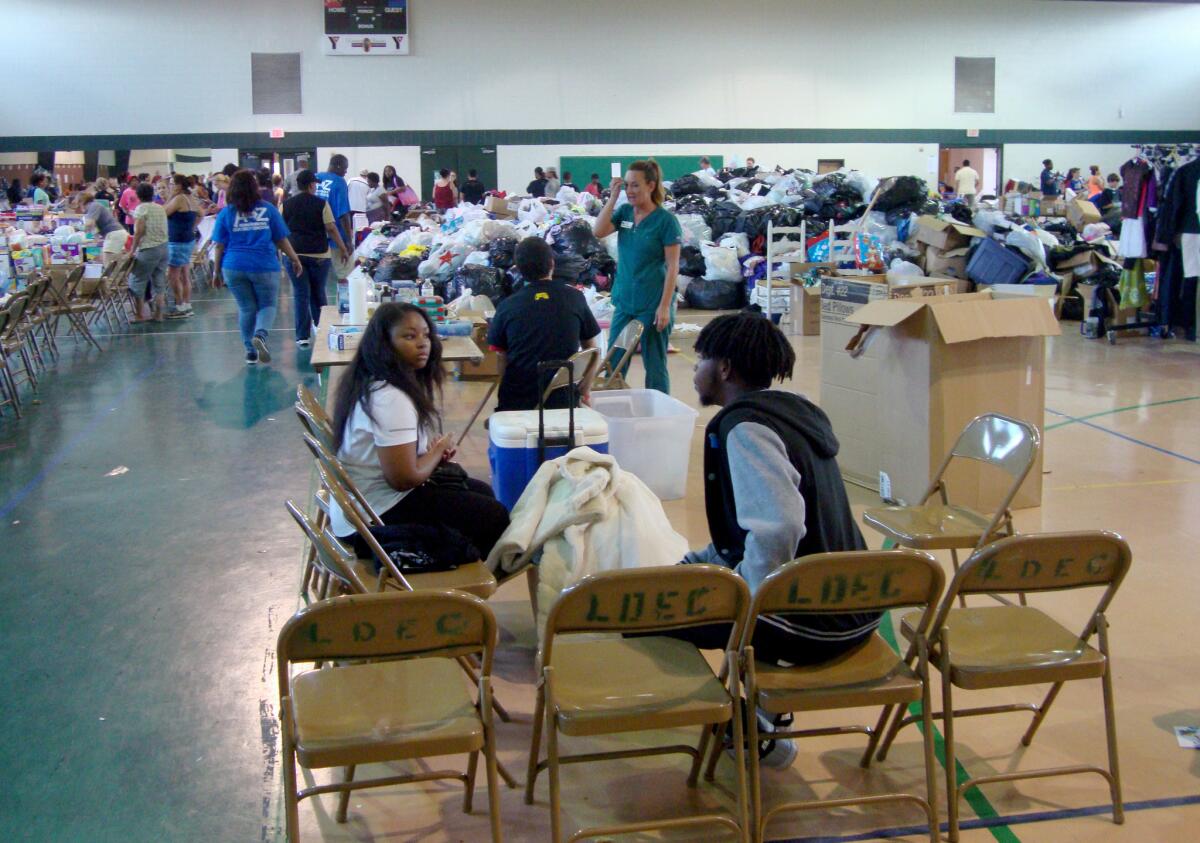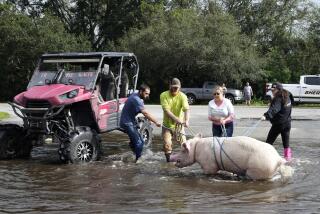‘What am I going to do?’ Louisiana flooding leaves thousands looking for housing as losses hit $20.7 billion

- Share via
Reporting from Gonzales, LA. — After her apartment in this small industrial riverfront town flooded, Mary Green-King ended up with hundreds of other evacuees at a shelter.
Just when it seemed things couldn’t get any worse — she also lost her car and had spent five nights at the shelter — her cellphone rang. It was her landlord of three years.
For the record:
5:15 p.m. Aug. 19, 2016An earlier version of this article misspelled Gonzales, La., as Gonzalez.
“I have 48 hours to get my stuff out,” Green-King lamented as she lay on her cot under an American Red Cross logo blanket Thursday. “All they said is, ‘You have 48 hours,’ with no compassion, no love.”
On Friday, an economic development group put flood losses at $20.7 billion. More than 110,000 homes have been damaged.

It’s been nearly a week since storms flooded Baton Rouge and surrounding central Louisiana parishes, killing 13 and displacing thousands in what the Red Cross is calling the worst natural disaster since Hurricane Sandy in 2012. So far, 9,000 claims have been filed for flood insurance, and 86,560 individual assistance claims have been made with the Federal Emergency Management Agency. But the assistance process has barely started, and there’s no clear plan for housing the roughly 4,000 residents who remain at 44 shelters statewide.
Homeland Security Secretary Jeh Johnson and FEMA Administrator Craig Fugate toured the region this week and promised aid.
“The federal government is here. We have been here; we will be here as long as it takes to help this community recover,” Johnson said Thursday, stopping by the Ascension Parish shelter at the Lamar Dixon Expo Center.
Green-King was among 475 evacuees at the shelter here in the town of Gonzales. She moved to Louisiana years ago from San Francisco, where she worked as a property manager. The retiree can’t understand how her landlord at Gonzales Gardens can throw her out so quickly in the midst of what’s being called the Great Flood of 2016.
“I don’t have transportation,” said Green-King, 67. “I don’t have nothing in place.”
Beside her, Sharon Bell was passing the time assembling a jigsaw puzzle with a big hole in the middle. Bell, 56, moved to Baton Rouge a decade ago from New Orleans after losing everything in Hurricane Katrina. A local family sponsored Bell, paying her first month’s rent. She paid them back, earned her associate’s, undergraduate and business school degrees, started a taxi company and settled in the suburb of Denham Springs.
That turned out to be one of the hardest-hit areas in the Great Flood.
Bell’s home was destroyed. She didn’t have flood insurance. She’s seen FEMA officials at the shelter and heard they have promised to provide better temporary housing than they did after Katrina, when new trailers laced with formaldehyde were blamed for injuries and deaths.
“They said they’re bringing in used trailers, not like they did last time,” Bell said. “But I’m asking what are we supposed to do in the meantime? I’m a working individual.”
She worries their safe haven won’t last long, even though “the governor came through the other day and told us they aren’t going to kick us out.”
Beside her, Green-King hailed a passing American Red Cross volunteer and asked, “Are they going to put us out on the street, young man?”
Volunteer Chris Kibodeaux wasn’t sure. He’d lost his home, too, and was staying in a camper with his 13-year-old son.
Green-King, wearing an aqua T-shirt that read “Bonafide Southern,” sighed. She thought of all that she’d lost: china, jewelry, clothing, her laptop left on the floor.
“What am I going to do?”

Green-King has renter’s insurance, but the insurance company told her it won’t pay because she didn’t have a flood clause. She already had paid this month’s $675 rent. She doesn’t have enough to rent a new place.
“I think I need to take a plane back to California,” she said.
Her landlord later sent a text: They plan to demolish the building next week. So Green-King found a friend to drive her over Friday and take stock.
She wasn’t optimistic.
“By this time, it’s all gone,” she said.
In Baton Rouge, one of the largest shelters opened at the Celtic Media Centre, which at one time housed 3,500 people. The shelter was down to 802 by Thursday, but many of those who remained faced unique challenges, officials said. Affordable apartments are scarce, especially for those who lack transportation, need to live near work or their children’s schools.
Some evacuees left the shelter only to return after running out of money for hotels or discovering their homes had sustained more damage than they thought.

More than 700 flood victims remained at a shelter in Ascension Parish outside Baton Rouge, La., nearly a week after a storm destroyed thousands of homes. More than 86,000 have filed for individual assistance from the Federal Emergency Management Age
Desiree Honore Thomas, assistant commissioner at the state Division of Administration, has been managing the shelter, making the rounds at four cavernous sound stages where sets for the “Twilight” saga and Tom Cruise’s “Oblivion” have been replaced with FEMA cots, pet carriers and playpens.
The facility and another large shelter at the downtown River Center Arena are a stark contrast to the squalor of the post-Katrina Superdome in New Orleans. There’s a beauty salon run by volunteers, a clinic, pharmacy, veterinarian, showers. In one building, they have allowed evacuees to stay with their dogs and cats. This week, three girls whose classes were postponed because of the flood bent over a pile of rainbow blocks, building a school.
All of the air-conditioned halls look and smell clean, thanks to a crew making regular sweeps, Thomas said. City buses stop outside. So do trucks offering free shaved ice or “snowballs.”
Security is tight. Evacuees are issued bracelets corresponding to their assigned studio, children wear masking-tape name tags and the facility is patrolled by the Louisiana State Police and National Guard.
“It’s evolved into a city within a city,” Thomas said.
She said officials will consolidate shelters as evacuees’ ranks thin but have no plans to close them.
See more of our top stories on Facebook »
Faye Knighten, 52, evacuated to the Celtic Media Centre shelter with her 4-month-old poodle, Marley, after her apartment flooded. She’s disabled, moved from the Bay Area seven years ago, doesn’t have family here and will need help starting over.
“I’m hoping our government comes through for us,” she said.
So does Verna Bourgeois. Since floodwaters surrounded her trailer, the 58-year-old Bourgeois and her husband have been staying with a friend and other evacuees, 14 of them in a three-bedroom house. The couple hope to move into a relative’s vacant home — if it survived the flood. Floodwaters still blocked too many roads for them to check.
Bourgeois went to the Gonzales shelter to register for assistance. She wasn’t even sure how to get her mail: The post office was still underwater. No one could tell her what to do.
“We’re in limbo,” she said.
Twitter: @mollyhf
ALSO
Obama to visit flood-ravaged Louisiana next week after returning from vacation
Louisiana flood victims praise Donald Trump for visiting damaged areas
More to Read
Sign up for Essential California
The most important California stories and recommendations in your inbox every morning.
You may occasionally receive promotional content from the Los Angeles Times.











